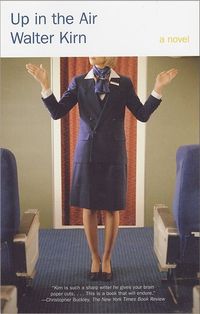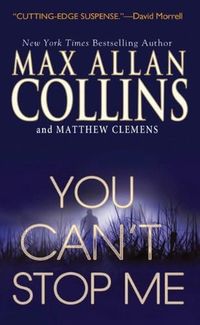 Two things got me thinking today about the challenges of adapting a book to the screen — my friend John Rogers' blog posts on the subject and the movie UP IN THE AIR, which I loved.
Two things got me thinking today about the challenges of adapting a book to the screen — my friend John Rogers' blog posts on the subject and the movie UP IN THE AIR, which I loved.
I've written a few adaptations over the years, some filmed (eg. Rex Stout's "Champagne for One," "Prisoner's Base" ) some not (eg. Mary Higgins Clark's "The Lottery Winners," Aimee & David Thurlo's Ella Clah novels), some filmed after they were taken over by others (eg. Marv Wolfman's "Blade"), some based on my own books (eg ".357 Vigilante" and "Mr. Monk Goes to the Firehouse,") and some inching tantalizingly towards production (Victor Gischler's "Gun Monkeys").
Some of my favorite book-to-movie adaptations include JAWS, GET SHORTY, GREAT EXPECTATIONS, TERMS OF ENDEARMENT, THE CIDER HOUSE RULES… and now, UP IN THE AIR. You can learn so much by watching the movies and then reading the books (or vice versa, of course).*
What all of my favorite adaptations have in common is that the screenwriters made major departures from the source material and yet still captured the essence of the books and what made them great. Often, the movies actually improve on the source material. JAWS is a good example of that…and so is UP IN THE AIR.
Major changes from the book are inevitable and necessary. For one thing, you're telling a story in two different mediums. As a result, the biggest changes often have less to do with artistic concerns than they do with the realities of production. If you're doing a movie, and not a six hour mini-series, you're going to have to make some hard choice about what to drop and what to condense. To do that, you have to sit down with the book, strip everything away and find the true heart of the story… and then build backward from there, keeping only those characters, moments, and plot strands from the book that support the essence of the tale. Your job isn't to transcribe the book to film (which is what the first HARRY POTTER movie felt like to me), but to write a great movie. In many ways, the book becomes inspiration, rather than something you should follow with slavish devotion. That's especially hard for authors adapting their own books to pull off (read John Irving's excellent memoir of his CIDER HOUSE RULES adaptation for a glimpse at that…and he managed the feat brilliantly).
Whenever I adapt a book, I read it first for pure pleasure and then afterwards ask myself if I liked it or not…and, if so, why? What is the story? What makes it special? What are the defining moments? What is the author trying to say? What is the tone?
If I'm adapting the book for a movie, I also ask myself what are the three acts?
If I'm adapting the book for a TV pilot, I also ask myself, what is the franchise and what are the conflicts that can generate episodes every week?
Then I re-read the book and highlight the key plot moments, the best lines of dialog, and any prose that sets the tone, establishes the theme, or reveals an important detail. At the same time, I also write a broad outline of the story as it exists in the book.
Next, I sit down and decide what the story is that I want to tell. Who are the central characters? What is the essence of the book? And then I write my own outline. Once I am happy with that, I go back and pluck out key lines of dialog or description that I want in the script. And then I start writing.
With "Ella Clah," a CBS pilot, Bill Rabkin & I decided that the most intriguing conflict in Aimee & David Thurlo's series of books was in the heroine's backstory: a female, Navajo FBI agent caught between two worlds, two nations, two ways of life. In the books, she's an ex-FBI agent who leads the Major Crimes Unit of the Navajo Police… so by keeping her an FBI agent, we made a major deviation. But we didn't end there. We gave her a male, Hispanic partner with some cultural conflicts of his own. And we resurrected a character who was killed off before the story started in the first book: Ella's father, a Navajo preacher, who drove around the Rez spreading the gospel, much to the shame of Ella's brother, a traditional Indian medicine man. We did it because we thought those conflicts would give us lots of interesting stories. Ultimately, instead of adapting "Blackening Song" or one of the other Ella Clah novels, we ended up writing an entirely new story but kept the characters true to who they were in the books. The pilot didn't sell, but I'm pleased to say that the authors were as pleased with the adaptation as we were.
With Victor Gischler's "Gun Monkeys," I streamlined everything, dropped the hero's entire family (and the subplots that went along with them), condensed events, and created an entirely new third act that I hoped stayed true to everything that I, and thousands of readers, loved about the Edgar-nominated book. At first, Victor was stunned by the changes but after getting over the surprise, he discovered that he actually really liked what I did (or at least that's what he tells me).
What I'm leading up to with all this is that I think UP IN THE AIR is a brilliant adaptation, one that aspiring writers can and should learn from. And yet, in many ways, it's not an adaptation at all. Let me explain…
Walter Kirn's book is about Ray Bingham, a charming yet emotionally remote guy who spends 322 days a year in the air, going from city-to-city firing people, and is on the verge of reaching a million domestic frequent flier miles, something that only a few others have ever attained. Oh, and he's also a motivational speaker reluctantly facing the prospect of going back home for his sister's wedding. Beyond that, and maybe a dozen lines of dialog, screenwriters Jason Reitman & Sheldon Turner scrapped everything else. Instead, they started from scratch with only the basic premise as a foundation.
It was a brave creative decision. And, I believe, also a necessary one.
They stripped the book down to its narrative studs — its unique voice, its attitude, and its central character. They created a much stronger narrative spine and added two new characters — a young woman at Ray's company who tags along with him on the road because she believes that his job can be done better via webcam and a traveling saleswoman much like himself who offers him no-strings-attached sex and might just be the soul-mate he never knew he was missing.
As different as UP IN THE AIR is from Walter Kirn's book, I would argue that it's a loyal adaptation, a pure distillation of the story's soul that is perfectly suited to the medium in which its being told. In many, many ways, I think the screenplay is a vast improvement over the book. The screen story is more focused, Ray Bingham is more sharply defined, and yet the message, the tone, and the unique point-of-view of the book remain the same.
In the end, virtually nothing from the book made it on the screen. And yet, I would argue that everything from the book is there. And, if you are a writer, accomplishing that contradiction is something to be admired.
UPDATE: I just saw Jason Reitman, who directed UP IN THE AIR, and his father Ivan Reitman, who co-produced it, interviewed together on Charlie Rose… and the story they tell of how the film was developed is very, very different than the one reported earlier in the press. Neither one of them mentioned the earlier scripts by Sheldon Turner and Ted Griffin, nor that Ivan was initially going to direct the movie for Dreamworks before Jason got involved. That said, it was interesting to hear Jason talk about the adaptation. His approach, not surprisingly, is to take what he needs from the source material to make a good movie…and go where-ever his inspiration takes him from there. I forgot to mention earlier that his adaptation of Christopher Buckley's THANK YOU FOR SMOKING is every bit as good as this one and is another terrific example of how to do it right.
===============
*let's not forget the great TV series adapted directly from books, like DEXTER, TRUE BLOOD, REBUS and MORSE (and, dare I say it, NERO WOLFE). You can learn a lot from them, too…even the ones that aren't directly based on the books, but rather the character or the franchise, like BONES, WIRE IN THE BLOOD, and many of the episodes of MORSE. When developing a book into a pilot/TV series, you have an even bigger challenge than you would simply adapting it for a feature. Not only do you want to be true to the essence of the book, and build a three-act structure into the tale, but you also have to develop an open-ended franchise, and the strong central conflicts, that together will become the narrative engine capable of generating 100 episodes. BONES did that brilliantly…so did DEXTER.



